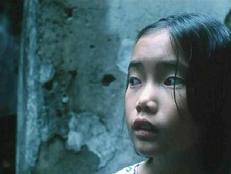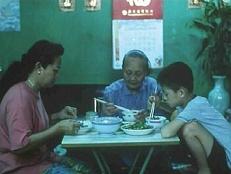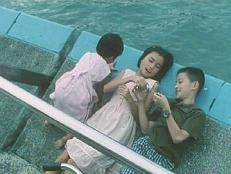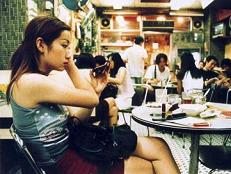Home for Border-crossers in Hong Kong in Fruit Chan's Little Cheung and Durian Durian
SIU Heng
Department of Comparative Literature,
The University of Hong Kong
Abstract
 Fruit Chan's films Little Cheung and its continuation Durian Durian provide rich texts for discussions on the notion of "home" for characters moving to Hong Kong from elsewhere. As "home" refers more to a sense of belonging than a physical shelter, their emotional ties to more than one community / space during the process of geographical relocation may give rise to dilemmas in the understanding of "home." For these characters, whom the author would call "border-crossers", the intertwining between emotional and economic activities has complicated their views on "home at Hong Kong". In the process of searching for home, they are always caught in the ambivalence of whether they should belong to this city. At the same time, Hong Kong people are also confused about allowing them to claim Hong Kong as home, same as all other "permanent residents" of the city. Negotiations between conflicting elements are always going on, evoking the dynamic side of home, which cannot be understood as a totality or a static notion but a concept of differences and fluidity.
Fruit Chan's films Little Cheung and its continuation Durian Durian provide rich texts for discussions on the notion of "home" for characters moving to Hong Kong from elsewhere. As "home" refers more to a sense of belonging than a physical shelter, their emotional ties to more than one community / space during the process of geographical relocation may give rise to dilemmas in the understanding of "home." For these characters, whom the author would call "border-crossers", the intertwining between emotional and economic activities has complicated their views on "home at Hong Kong". In the process of searching for home, they are always caught in the ambivalence of whether they should belong to this city. At the same time, Hong Kong people are also confused about allowing them to claim Hong Kong as home, same as all other "permanent residents" of the city. Negotiations between conflicting elements are always going on, evoking the dynamic side of home, which cannot be understood as a totality or a static notion but a concept of differences and fluidity.
1. Introduction: Home and Border-Crossers
 Fruit Chan's films Little Cheung and its continuation Durian Durian provide rich texts for discussions on the notion of home for characters moving to Hong Kong from elsewhere. These characters include the Filipino maid Armi and the little illegal immigrant from Shenzhen Ah Fan in Little Cheung, and in Durian Durian, the prostitute Xiao Yan.
Fruit Chan's films Little Cheung and its continuation Durian Durian provide rich texts for discussions on the notion of home for characters moving to Hong Kong from elsewhere. These characters include the Filipino maid Armi and the little illegal immigrant from Shenzhen Ah Fan in Little Cheung, and in Durian Durian, the prostitute Xiao Yan.
Home is conventionally understood as a physical place, but Rey Chow (1999, 37) thinks otherwise. "Signifying an ideal of a primordial togetherness, the home is … the production of … the opposition between myself or ourselves …and the hostile world outside." Between such an abstract sense of home and our commonsensical understanding of physical home, there is a whole space in-between where negotiation for home takes place.
In this paper, I will look at home as a sense of belonging to a community, in which both the relation to a physical place and the affective bond with the people therein come into play. Home is not purely geographical, although the geographical factor cannot be ignored. As such, the characters' ties to more than one community during the process of geographical relocation may give rise to dilemmas in their understanding of home. The issue of home is more complicated in these two films as both are set in 1997, when conditions in Hong Kong are changing in face of the handover.
 I would call these characters "border-crossers". I avoid using the terms "migrants" or "sojourners" because they in one way or another hint their destinies of either staying or leaving Hong Kong. Instead of knowing where their home is, each of these characters is constantly negotiating for a home and, in their process of searching emerges a more dynamic notion of home.
I would call these characters "border-crossers". I avoid using the terms "migrants" or "sojourners" because they in one way or another hint their destinies of either staying or leaving Hong Kong. Instead of knowing where their home is, each of these characters is constantly negotiating for a home and, in their process of searching emerges a more dynamic notion of home.
2. The Conflicting Nature of Border-Crossing Experiences
First of all I am going to look at the merging of two seemingly incompatible yet coexisting activities in their border-crossing experiences, namely economic and affective activities.
Economic activities are conventionally regarded as masculine (Ong 1993, 758), but these three characters appear to have subverted such conventional gender roles through their engagement in the economy. Yet their subversion is not a complete one: their means of earning money, doing housework or washing dishes, are still somewhat related to the traditional female domestic responsibility. Even if gender is the only consideration, their activities are already ambivalent in nature.
All three characters are heavily involved in economic activities, so much so that they seem to have become what Aihwa Ong calls homo economicus (1993, 750). But Ong is critiquing the "flexible citizenship" of the middle-class in making money, yet Armi, Ah Fan and Xiao Yan belong to a totally different class like many other characters in Fruit Chan's films. Their economic activities, unlike the "flexible citizens", are intertwined with affective elements and become important in their understanding of home.
 Armi and Xiao Yan come to Hong Kong primarily because of economic reasons, but what they used to generate income is some kind of affectivity: taking care of a family in the case of Armi, and for Xiao Yan, sex, which is normally seen as an act of intimate affective bond. To them, wealth comes from affectivity, which is usually associated with home; yet wealth is accumulated by leaving their geographical homes, as Aihwa Ong says that "Flexible accumulation separates home and the workplace by national boundaries." (1993, 761)
Armi and Xiao Yan come to Hong Kong primarily because of economic reasons, but what they used to generate income is some kind of affectivity: taking care of a family in the case of Armi, and for Xiao Yan, sex, which is normally seen as an act of intimate affective bond. To them, wealth comes from affectivity, which is usually associated with home; yet wealth is accumulated by leaving their geographical homes, as Aihwa Ong says that "Flexible accumulation separates home and the workplace by national boundaries." (1993, 761)
While affective experiences bring about money, economic activities can also bring about affect. Ah Fan becomes a good friend of Little Cheung because she wants to earn money by working in Little Cheung's restaurant. To her, money is also essential in bringing about family reunion, for it can be used to bribe the Chinese officials, or it is needed in supporting their living in Hong Kong.
But we must not forget that illegal immigrants like Ah Fan are repatriated from Hong Kong also because of economic reasons. Mainland immigrants are not welcome as they are perceived as a burden to Hong Kong's economy (Law 1997, 12-3). In sum, economic activities may destroy affect as much as they may bring about it, and hence economic activities may change the border-crossers' views on home which is a notion closely related to affectivity.
3. Home at Hong Kong?
Now let's come to look at whether Armi, Ah Fan and Xiao Yan see Hong Kong as home. Armi seems rather emotionally detached from the Hong Kong family she is working for, but she shares a common interest with many Hong Kong people over the gossips about Brother Cheung. She is in opposition with Little Cheung's family when complaining about over-time work, but feels being part of it when a local gangster David tries to extort "protection fees". Language may provide another interesting example of her contradictory sense of home. Having the same language is important in sharing the a sense of belonging, but Armi uses colloquial Cantonese expressions like chi sin (痴線) or kou nei lo mo (溝你老母) to voice out her grievances against Hong Kong people.
 Contrary to Armi, Ah Fan seems to have failed to connect to Hong Kong people on a lot of occasions. However, in one significant scene, she and Little Cheung compete to claim Hong Kong as their own. Ah Fan is showing a sense of belonging to Hong Kong, so intense that she thinks the place belongs to her. But at the same time she does not have a sense of unity with Hong Kong people. An struggle of whether or not Hong Kong is her home is taking place.
Contrary to Armi, Ah Fan seems to have failed to connect to Hong Kong people on a lot of occasions. However, in one significant scene, she and Little Cheung compete to claim Hong Kong as their own. Ah Fan is showing a sense of belonging to Hong Kong, so intense that she thinks the place belongs to her. But at the same time she does not have a sense of unity with Hong Kong people. An struggle of whether or not Hong Kong is her home is taking place.
Ah Fan's negotiation for home in the film Little Cheung carries on to Durian Durian. She may be reluctant to give up her old home, but at the same time finds "home at Hong Kong" somewhat attractive. Her attempt of eating durian in the film can be read as a metaphor of this struggling experience. She finds the stink of the durian repulsive, but it is also attractive as the "king of fruits". However, at the end of Durian Durian, she closes up earlier possibilities and decides to treat Shenzhen as home.
Home for Xiao Yan is more complicated. She seems to have no fixed home in the first half of the film. She lives in Hong Kong but she is very indifferent to the place. Yet when she is back at her geographical home, namely Northeastern China, some everyday life details in Hong Kong, such as the use of plastic gloves in washing dishes, come back to haunt her. She only begins to feel a sense of belonging to Hong Kong when she is not there physically.
 Northeastern China is her geographical home, but that is no longer familiar to her. When she concentrates on money making in Shenzhen and Hong Kong, she may have repressed her desire for home and now her geographical home becomes an uncanny place, uncanny in the Freudian sense. While she is back at her geographical home, her friends at this home go into dispersal. She even divorces her husband. The community to which she once belongs is in the forever lost past.
Northeastern China is her geographical home, but that is no longer familiar to her. When she concentrates on money making in Shenzhen and Hong Kong, she may have repressed her desire for home and now her geographical home becomes an uncanny place, uncanny in the Freudian sense. While she is back at her geographical home, her friends at this home go into dispersal. She even divorces her husband. The community to which she once belongs is in the forever lost past.
To some extent this is also the case for Armi. She has never cried so sadly on any occasion other than knowing that her husband has a mistress in the Philippines. But Armi is not in total despair. She has demonstrated her potential to become what Robert Park (1969, 141) calls a "cultural hybrid". We can see her singing Filipino songs with Little Cheung in her arms. However, it is a pity that the film has never gone into in-depth portrayals of her inner world. Nonetheless a "between-worlds consciousness" suggested by Park is perhaps a positive outcome of the border-crossers' search for home.
No matter what the outcome is, the process of home searching is always full of "collisions, conflicts and fusion of people and culture" as Park says (1969, 132). If the attempt to eat durian is regarded as the metaphor for the negotiation for home, although durian can definitely be interpreted in other ways, then the violence in opening a durian, by Ah Fan's family and Xiao Yan in the film may be regarded as a metaphor of such collisions and conflicts.
4. Border-Crossers as Insiders and Outsiders
Let's now shift the focus from the border-crossers' view on Hong Kong to Hong Kong people's views on them. Little Cheung's voice over in the beginning of the film says that everybody in Hong Kong is money-oriented. It seems that money making, as I have discussed in the beginning, is what defines Hong Kong people. As such, Hong Kong people should see Armi, Ah Fan and Xiao Yan as part of the community because they are all making money in Hong Kong just like what other Hong Kong people are doing.
 Upon closer examination, they are, however, both insiders and outsiders to the Hong Kong community. Little Cheung finds Ah Fan odd for going to work instead of school. Her ability to control a big bike also adds to her foreignness because the bike is uncontrollable to him. Bike in the film is something symbolic, not only because it is an icon of Mainland Chinese, but also because Little Cheung rides this big bike to chase Ah Fan in the end. Trying to pick up Ah Fan's skills of riding the big bike can be interpreted as an attempt to identify with her at a moment of emotional alliance with her. However this sense of sharing the same home with her is only momentary, for he mistakenly followed an ambulance, which is perhaps something more familiar to him.
Upon closer examination, they are, however, both insiders and outsiders to the Hong Kong community. Little Cheung finds Ah Fan odd for going to work instead of school. Her ability to control a big bike also adds to her foreignness because the bike is uncontrollable to him. Bike in the film is something symbolic, not only because it is an icon of Mainland Chinese, but also because Little Cheung rides this big bike to chase Ah Fan in the end. Trying to pick up Ah Fan's skills of riding the big bike can be interpreted as an attempt to identify with her at a moment of emotional alliance with her. However this sense of sharing the same home with her is only momentary, for he mistakenly followed an ambulance, which is perhaps something more familiar to him.
Little Cheung's separation with Ah Fan is ironically juxtaposed with the reintegration of Hong Kong to China. In the film, scenes of learning Putonghua, hoisting the Chinese national flag, etc. all point to the question of whether mainland China, instead of Hong Kong, is the home for Hong Kong people. This question complicates the whole issue of home, when placed side-by-side with Hong Kong people's struggle of whether or not to allow Mainlanders like Ah Fan to claim Hong Kong as home.
Hong Kong people indeed have a love-hate relationship with these border-crossers. Little Cheung was taught not to play with Ah Fan for she is a "child without permit" (mo ching yi tung 無証兒童), and he uses patronizing names such as "ghost girl" (gwei mui 鬼妹) and later "Filipino girl" (bun mui 賓妹) to address Armi. But he turns out to have established a very close affective bond with these people, even closer than with his biological parents and relatives.
 Hong Kong people want to include the border-crossers, legal or illegal, as part of the workforce, but at the same time they want to exclude them from the community. A line from Xiao Yan's pimp in Durian Durian can serve as a very good footnote to this point, be it a deliberate design in the film or not. He says, "Xiao Yan you are so disgusting. Why put used toilet papers here? Flush them in the toilet!" People need to use toilet papers but they do not want to see used ones.
Hong Kong people want to include the border-crossers, legal or illegal, as part of the workforce, but at the same time they want to exclude them from the community. A line from Xiao Yan's pimp in Durian Durian can serve as a very good footnote to this point, be it a deliberate design in the film or not. He says, "Xiao Yan you are so disgusting. Why put used toilet papers here? Flush them in the toilet!" People need to use toilet papers but they do not want to see used ones.
Waste matters are just as significant in Little Cheung. Little Chueng's urine and a prostitute's menstrual blood are mixed into a gangster David's drink as a weapon to fight against this gangster. This can also be read allegorically: the border-crossers are unwanted but potentially subversive. In their search for home in Hong Kong, they have become an indispensable part of the Hong Kong community. Such a reading echoes well Julia Kristeva's theory of abjection. Border-crossers form part of Hong Kong that Hong Kong wants to get rid of, just like waste matters in Kristeva's eyes.
While the border-crossers are negotiating for a home, home for Hong Kong people has changed as well. Just as when durian has become part of Xiao Yan's pimp after he eats it, he has the smell of durian on him that everyone in the tea restaurant notices.
5. Conclusion: The Dynamics of Home
Armi, Ah Fan and Xiao Yan are negotiating between conflicting elements for a home. They develop some sense of belonging to Hong Kong, though they do not identify with Hong Kong people entirely. As Stuart Hall (1990, 226-7) suggests, there exist the dimensions of similarity and difference in the notion of home, which has "to be thought of in terms of the dialogic relationship between these two axes." They also emerge as both insiders and outsiders to the Hong Kong community. While Hong Kong is changing their sense of home, they are changing that of Hong Kong people as well.
 As Hall suggests, the negotiation between similarities and differences is subject to "the continuous play of history, culture and power", as we can see that the home for the border-crossers is constantly being shaped by special conditions of the 1997 Hong Kong. The notion of home in Little Cheung and Durian Durian therefore cannot be understood as a totality or a static notion, but a concept of differences and fluidity.
As Hall suggests, the negotiation between similarities and differences is subject to "the continuous play of history, culture and power", as we can see that the home for the border-crossers is constantly being shaped by special conditions of the 1997 Hong Kong. The notion of home in Little Cheung and Durian Durian therefore cannot be understood as a totality or a static notion, but a concept of differences and fluidity.
Works Cited
- Chow, Rey. 1999. Nostalgia of the New Wave: Structure in Wong Kar-wai's Happy Together. Camera Obscura 42: 31-48.
- Hall, Stuart. 1990. Cultural identity and diaspora. Identity: Community, culture, difference, Ed. Jonathan Rutherford, 222-237. London: Lawrence & Wishart.
- Kristeva, Julia. 1982. Power of Horror. Trans. Leon S. Roudiez. New York: Columbia University Press.
- Law Chi-kwong. 1997. Policy on new immigrants 新移民政策. Hong Kong: Legislative Councillor Law Chi-kwong's Office.
- Ong, Aihwa. 1993. On the edge of empires: Flexible citizenship among Chinese in diaspora. Positions 3(1):745-778.
- Park, Robert. 1969. Human migration and the marginal man. Classic Essays in the cultures of cities, Ed. Richard Bennett, 131-142. Englewood Cliffs, NJ: Prentice-Hall.
(Paper presented at the Fulbright Film Symposium on Hong Kong / Hollywood at the Borders: Alternative Perspectives, Alternative Cinemas. Hong Kong, 1-5 April 2004.)

